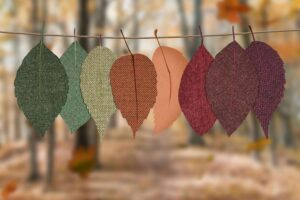Fashion with a Conscience

In recent years, sustainability has become an increasingly important consideration in the fashion industry. As consumers become more conscious of the environmental and ethical implications of their clothing choices, there has been a growing interest in plant-based textiles as an eco-friendly alternative to conventional fabrics. From luxurious silks to versatile cottons and innovative bamboo fibers, plant-based textiles offer both beauty and sustainability. In this blog, we’ll delve into the world of green glamour and explore the beauty of plant-based textiles in fashion.
The Rise of Plant-Based Textiles
Plant-based textiles have a rich history dating back thousands of years, with civilizations around the world harnessing the natural fibers of plants for clothing and textiles. Today, the popularity of plant-based textiles is experiencing a resurgence as designers and consumers alike seek sustainable alternatives to synthetic fabrics derived from petroleum-based materials. From organic cotton and linen to innovative fibers made from bamboo, hemp, and even pineapple leaves, plant-based textiles offer a diverse range of options for eco-conscious fashion enthusiasts.
Luxurious Silk
Silk, often associated with luxury and elegance, is a natural protein fiber produced by silkworms. While traditional silk production involves the harvesting of silkworm cocoons, innovative cruelty-free methods have emerged, such as Peace Silk or Ahimsa Silk, which allow the silkworm to complete its life cycle before harvesting the silk. In addition, plant-based alternatives to silk, such as Tencel™ and lyocell, offer similar lustrous and silky textures derived from sustainably sourced wood pulp, making them cruelty-free and environmentally friendly options for conscious consumers.
Versatile Cotton
Cotton is one of the most widely used plant-based textiles in the world, prized for its softness, breathability, and versatility. However, conventional cotton cultivation often involves heavy pesticide use, water-intensive irrigation, and environmental degradation. Organic cotton, on the other hand, is grown without synthetic pesticides or fertilizers, promoting soil health and biodiversity. Additionally, innovations in cotton farming practices, such as regenerative agriculture and water-saving techniques, are further reducing the environmental impact of cotton production, making it a more sustainable choice for eco-conscious fashionistas.
Innovative Bamboo Fibers
Bamboo is a fast-growing and highly renewable plant that holds great promise as a sustainable textile fiber. Bamboo fibers are soft, silky, and breathable, with natural antibacterial properties that make them ideal for sensitive skin. Bamboo cultivation requires minimal water and pesticides, making it an environmentally friendly alternative to conventional crops. However, it’s important to note that while bamboo fibers themselves are sustainable, the chemical processes used to convert bamboo into textile fibers, such as bamboo viscose, may have environmental implications. Look for certifications such as Oeko-Tex Standard 100 to ensure that bamboo textiles are produced in an eco-friendly manner.
Durable Hemp
Hemp, derived from the Cannabis sativa plant, is one of the oldest known plant-based textiles, dating back thousands of years. Hemp fibers are incredibly strong, durable, and resistant to mold and mildew, making them ideal for a wide range of clothing and textile applications. Hemp cultivation requires minimal water and pesticides, making it a highly sustainable crop. Additionally, hemp fibers can be blended with other materials, such as organic cotton or recycled polyester, to create hybrid fabrics with enhanced performance and sustainability.
Innovations in Plant-Based Textiles
In addition to traditional plant-based textiles, innovative materials derived from agricultural waste and byproducts are revolutionizing the fashion industry. For example, Piñatex®, made from pineapple leaf fibers, offers a sustainable alternative to leather with a similar texture and appearance. Similarly, fabrics made from orange peels, apple skins, and mushroom mycelium are paving the way for a more sustainable and circular fashion economy. These innovative plant-based materials not only reduce waste but also minimize the environmental impact of fashion production, offering eco-conscious consumers truly green glamour options.

As the fashion industry grapples with the challenges of sustainability and ethical sourcing, plant-based textiles are emerging as a green glamour solution for eco-conscious consumers. From luxurious silks and versatile cottons to innovative bamboo fibers and durable hemp, plant-based textiles offer beauty, performance, and sustainability in equal measure. By choosing plant-based fashion options, consumers can embrace green glamour and contribute to a more sustainable and ethical fashion future. Let’s celebrate the beauty of plant-based textiles and pave the way for a more stylish and sustainable wardrobe.

